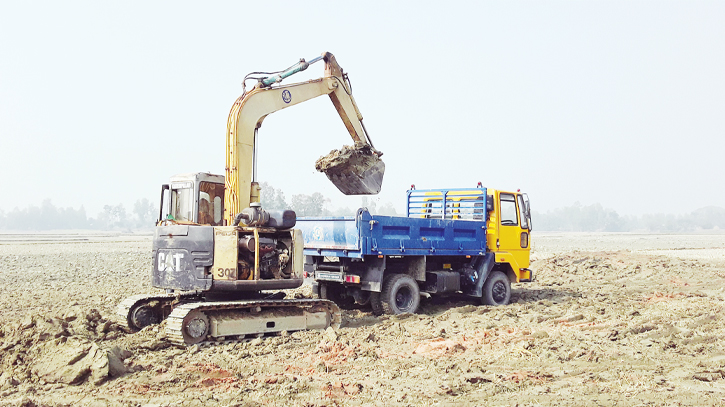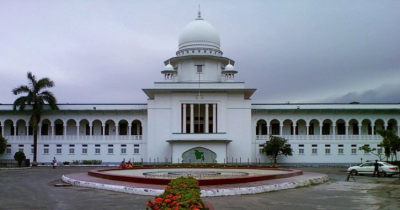
CAPTION: The relentless excavation of fertile land for pond construction in Sirajganj is steadily diminishing the available arable area, imperiling the region’s agricultural output. Photo: Messenger
Illegal pond digging has become rampant in Sirajganj, wreaking havoc on agricultural lands and jeopardizing the region's status as a granary in North Bengal. This destructive trend stems from the lure of higher profits in fish farming, prompting locals to convert arable land into ponds.
Among Sirajganj's nine upazilas, Tarasha stands out for its extensive paddy cultivation. However, the relentless excavation of fertile land for pond construction is steadily diminishing the available arable area, imperiling the region's agricultural output. The consequences are dire: a significant reduction in cropland is anticipated by year's end.
Sirajganj boasts a diverse agricultural landscape, yielding crops like paddy, wheat, khira, cucumber, jute, brinjal, dal, garlic, green chilies, and sugarcane, with surplus production sold nationwide. Nonetheless, the unchecked proliferation of illegal pond digging threatens to transform this food-abundant district into one plagued by scarcity, exacerbating food shortages across the country.
Statistics from the upazila agriculture department reveal a disturbing trend: from 2008 to 2023, a staggering 2,539 ponds were excavated, resulting in the loss of 1,920 hectares of arable land over fifteen years. Moreover, the relentless movement of earthmoving dump trucks and tractors not only destroys agricultural land but also damages roads and highways.
Despite efforts by authorities, including punitive measures such as imprisonment and fines, illegal pond digging persists unabated. The consequences are far-reaching, with projected declines in rice production and heightened environmental risks, including flooding.
Locals point fingers at individuals like Haji Babu, Alamin, and Khoka, who flout government bans by clandestinely digging ponds in various villages, often with the collusion of corrupt officials. Even as the upazila administration intervenes sporadically, the illicit practice continues, encroaching upon the agricultural, river, and Khas lands alike.
Justifications provided by offenders like Haji Babu and Alamin underscore a pervasive disregard for regulations, citing longstanding traditions of pond excavation in Tarash. Meanwhile, community members like Tariqul Islam, Shajahan Ali, and Akhtar Hossain lament the adverse impacts on local ecosystems and agricultural productivity.
Messenger/Faria








